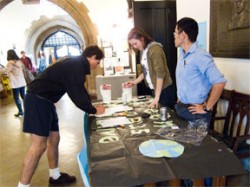 On November 2nd, the first Nestlé Pure Life retail store celebrated its two-year anniversary. To mark the occasion, UChicago Students Against Bottled Water gathered on the University of Chicago campus to hold a “Tap Water Challenge,” pitting Nestlé’s Pure Life against the tap to show that when it comes to healthy beverages, water doesn’t have to be in a bottle. Student organizers of the tap water challenge from UChicago Students Against Bottled Water and MEChA, (Movimiento Estudiantil Chicano/a de Aztlan) with the support of the Little Village Environmental Justice Organization (LVEJO) joined more than a dozen college campuses and communities around the country in a national initiative to stop its aggressive marketing in Latino communities.
On November 2nd, the first Nestlé Pure Life retail store celebrated its two-year anniversary. To mark the occasion, UChicago Students Against Bottled Water gathered on the University of Chicago campus to hold a “Tap Water Challenge,” pitting Nestlé’s Pure Life against the tap to show that when it comes to healthy beverages, water doesn’t have to be in a bottle. Student organizers of the tap water challenge from UChicago Students Against Bottled Water and MEChA, (Movimiento Estudiantil Chicano/a de Aztlan) with the support of the Little Village Environmental Justice Organization (LVEJO) joined more than a dozen college campuses and communities around the country in a national initiative to stop its aggressive marketing in Latino communities.
The action is spurred by a recent study in the Archives of Pediatric Adolescent Medicine that found that Latino and black parents were three times more likely to choose bottled water over the tap for their children, citing safety and health concerns as the primary reason. “Nestlé’s targeting of Latinos is just the latest attempt by bottled water corporations to try to convince communities and individuals that the only choice for families looking to choose healthy beverages is bottled water,” said Raquel Nunez of the Little Village Environmental Justice Organization.
Many times, Latino immigrant community members come from countries where many people lack access to clean, safe drinking water from public sources. So the very communities who understand first-hand the need for strong public water systems and often are least able to afford expensive branded bottled water, are the ones being targeted for aggressive market expansion. “Nestlé’s marketing creates a false choice between sodas and bottled water and attempts to convince people that the only reliable way to keep your family healthy is bottled water,” said Lauren Tarpey of UChicago Students Against Bottled Water. UChicago Students Against Bottled Water is supporting this national movement by working to end the sale of bottled water on campus and to make tap water more accessible for students.










